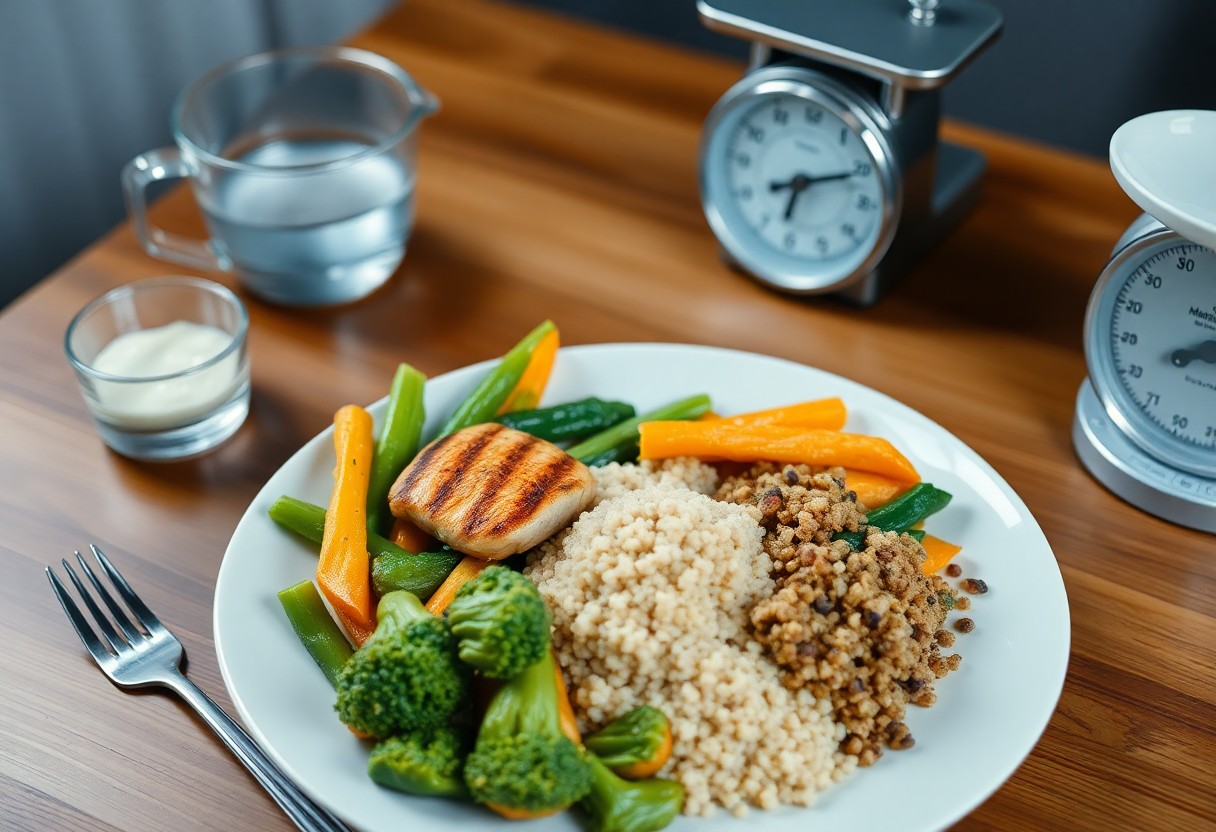Why Portion Control Is Key To Sustainable Weight Loss
Smart Technology And Sustainability – Reducing Your Carbon Footprint
April 16, 2025Portion Control Hacks To Reduce Food Waste Easily
April 17, 2025You need to understand that portion control plays a vital role in achieving and maintaining your weight loss goals. By managing the amounts you eat, you can create a calorie deficit while still enjoying your favorite foods. This practice not only helps prevent overeating but also fosters a healthier relationship with food. Implementing portion control into your daily routine empowers you to make conscious choices that can lead to long-term weight management without the need for restrictive diets, ensuring that your weight loss journey is both effective and sustainable.
Key Takeaways:
- Mindful Eating fosters awareness of hunger and satiety signals, allowing individuals to enjoy food while avoiding overeating.
- Balanced Nutrition ensures that portion control leads to a varied diet, providing crucial nutrients without excess calories.
- Consistent Habits help establish a sustainable eating pattern, making it easier to maintain weight loss over time.
Understanding Portion Control
Before initiateing on your weight loss journey, it’s vital to grasp the concept of portion control. This practice involves managing the amount of food you consume at each meal, which directly influences your overall caloric intake. By understanding portion sizes, you can cultivate healthier eating patterns that support sustainable weight loss without the need to deprive yourself of your favorite foods.
Definition and Importance
Any successful weight management strategy hinges on knowing what constitutes a proper portion. Portion control helps you to limit excessive calorie consumption while still enjoying a variety of foods. By focusing on portion sizes, you develop a healthier relationship with food, making it easier to maintain your weight loss over time.
Psychological Impact on Eating Habits
After you become aware of portion control, you’ll notice a significant shift in your eating habits. Practicing this technique can alter the way you perceive food, leading to mindful eating and better choices. This newfound awareness enables you to distinguish between true hunger and emotional triggers, promoting more balanced eating practices.
Impact of portion control extends beyond just physical health; it also influences your psychological relationship with food. When you practice portion control, you reinforce the understanding that smaller servings can still satisfy your cravings. This mindset can help reduce feelings of guilt associated with eating, while also diminishing the tendency to indulge in emotional eating. Ultimately, your approach to meals shifts to a more balanced and thoughtful experience, empowering you to connect with food in a healthier way.
The Science Behind Portion Sizes
While many people focus on what they eat, understanding the science behind portion sizes is vital for effective weight management. Research shows that the visual cues of portion sizes can significantly influence your eating habits. When presented with larger portions, you are likely to consume more, regardless of hunger levels. By being mindful of portion sizes, you can train your body to recognize appropriate serving amounts, leading to healthier eating patterns and aiding in sustainable weight loss.
Caloric Density and Nutritional Value
Caloric density refers to the number of calories in a specific weight or volume of food. Foods with high caloric density often contribute to weight gain if consumed in large portions, as they offer excess calories without significant nutritional value. On the other hand, foods low in caloric density, such as fruits and vegetables, allow you to eat larger portions while still managing your caloric intake effectively. By choosing foods that are rich in nutrients and low in calories, you can satiate your appetite without overindulging.
Metabolic Responses to Portion Control
Metabolic responses to portion control can influence your hunger signals and overall calorie expenditure. By practicing portion control, you help regulate your body’s natural hunger hormones like ghrelin and leptin, which play significant roles in appetite and satiety. This can help you manage your cravings better, ensuring you stay aligned with your weight loss goals.
With effective portion control, you are positively impacting your metabolism. Research indicates that regular moderation can lead to improved sensitivity to your body’s hunger signals, helping you to avoid the tempting urge to overeat. It’s crucial to be aware that large portion sizes can lead to an increase in caloric intake, which fuels weight gain. By creating a balanced habit of recognizing and consuming appropriate serving sizes, you support your body’s natural processes and enhance your ability to maintain long-term weight management.
Strategies for Effective Portion Control
Now, mastering portion control is imperative for sustainable weight loss. You can begin by understanding the concepts of serving sizes and using visual aids to measure your meals. Portion control could be the answer to stalled weight loss. Incorporate mindful eating practices by focusing on your food and savoring each bite to help you identify when you’re truly satisfied.
Practical Tips for Everyday Life
Life offers numerous ways to implement portion control seamlessly. Here are some practical tips:
- Use smaller plates to visually trick your brain into feeling full with less food.
- Pre-portion your snacks to prevent overeating.
- Serve meals in the kitchen instead of family-style at the table.
Thou shall find that these strategies can significantly impact your weight loss journey.
Tools and Resources to Aid Portion Control
Above all, utilizing tools can help you manage portion control effectively. For instance, measuring cups, digital food scales, and portion control plates can provide accurate serving sizes. Additionally, using apps that track your food intake can offer insightful data about your eating habits. Educating yourself about serving sizes and staying disciplined with these tools will enhance your ability to control portions. Ultimately, keeping your long-term goals in mind will motivate you to stay on track.
Portion Control and Long-Term Weight Management
For lasting weight management, it’s vital to adopt effective portion control strategies. By being mindful of the amounts of food you consume, you can create a sustainable eating pattern that fits seamlessly into your lifestyle. This approach not only promotes healthy habits but also helps you avoid the cycle of yo-yo dieting. Consistently monitoring your portions can set the foundation for a balanced diet that effectively supports your weight loss goals and enhances your overall well-being.
Building Sustainable Habits
Along your journey toward weight loss, establishing sustainable habits is vital. Start by gradually adjusting your portion sizes, allowing your body to adapt to new eating patterns. Focus on incorporating more whole foods into your meals and staying aware of your hunger cues. By creating a balanced approach to eating and routinely practicing portion control, you can foster long-lasting habits that will keep your weight stable over time.
The Role of Portion Control in Preventing Weight Regain
Control plays a significant role in preventing weight regain after achieving your weight loss goals. It helps you maintain your desired weight by consistently managing your food intake. If you’re not cautious, it’s easy to slip back into oversized portions, making it more challenging to keep the weight off. Keeping your portions in check not only helps combat the urge to overeat but also reinforces a positive relationship with food, allowing you to enjoy your meals without the fear of regaining weight.
With disciplined portion control, you can significantly reduce the risk of weight regain. By consistently monitoring your serving sizes and remaining mindful during meals, you can develop a clearer understanding of what your body needs. Furthermore, adhering to appropriate portions will help prevent the common pitfalls of emotional or stress eating, which can lead to unwanted pounds. Ultimately, striking this balance allows you to enjoy a variety of foods while ensuring your long-term success in weight management.

Common Challenges and Solutions
Not every journey towards sustainable weight loss is smooth. You may encounter challenges that test your commitment to portion control, whether it’s social gatherings, emotional triggers, or other lifestyle factors. Understanding these obstacles can help you develop strategies to overcome them and maintain your progress.
Dealing with Social Situations
Behind every social event lies the temptation to indulge. Friends and family often celebrate with food, making it difficult to stick to your portion control goals. To manage this, consider eating a healthy snack before the event, bringing a portion-controlled dish, or politely declining certain offerings without feeling guilty.
Overcoming Emotional Eating
Across the weight loss journey, emotional eating can be a persistent hurdle. You might turn to food in times of stress, boredom, or sadness, which can derail your efforts. To combat this, recognize your triggers and find alternative coping strategies, such as journaling, engaging in a hobby, or reaching out to friends for support. Establishing and practicing healthy habits in place of emotional eating can not only help you control portions but also foster a positive relationship with food.
The Relationship Between Portion Control and Mindful Eating
Keep in mind that practicing portion control is an vital component of mindful eating. By consciously measuring your food intake, you develop a deeper awareness of what you consume, allowing you to make intentional choices that align with your weight loss goals.
Enhancing Awareness of Food Intake
Among the benefits of portion control is the enhancement of your awareness of food intake. By focusing on specific serving sizes, you begin to notice how much you’re actually eating, fostering a connection to your body’s hunger and fullness signals.
Cultivating a Positive Relationship with Food
Along this journey, cultivating a positive relationship with food is vital. Instead of viewing food as a source of guilt, you can learn to appreciate its role in your life while also recognizing the importance of moderation in your diet.
But to cultivate this positive relationship, you must shift your mindset and understand that food is not the enemy. Engage with your meals by savoring each bite and appreciating the flavors and textures rather than counting calories obsessively. This approach allows you to enjoy food without the burden of guilt, paving the way for a sustainable weight loss journey while respecting your body’s natural cues. By fostering a sense of gratitude for nourishing meals and practicing portion control, you can embrace a healthier lifestyle.
Conclusion
Ultimately, portion control is imperative for achieving and maintaining sustainable weight loss. By understanding and managing your serving sizes, you can enjoy a variety of foods while still maintaining a caloric deficit and preventing overeating. This mindful approach not only helps you reach your weight loss goals but also fosters better eating habits for the long term. With consistent practice of portion control, you can pave the way for a healthier lifestyle that supports your journey to lasting wellness.
Q: Why is portion control important for sustainable weight loss?
A: Portion control is necessary for sustainable weight loss because it helps manage calorie intake without feeling deprived. By consuming appropriate portions, individuals can still enjoy a variety of foods while reducing the likelihood of overeating. This practice encourages awareness of servings and helps individuals develop a healthier relationship with food, ultimately promoting long-term weight management.
Q: How can portion control assist in maintaining a balanced diet?
A: Portion control plays a significant role in maintaining a balanced diet by allowing for moderation of all food groups. It helps prevent the overconsumption of high-calorie or less nutritious foods while encouraging the inclusion of fruits, vegetables, whole grains, and lean proteins. By controlling portions, individuals can ensure they receive the necessary nutrients without exceeding their caloric needs, fostering a well-rounded approach to eating.
Q: What strategies can be employed to practice portion control effectively?
A: Effective strategies for practicing portion control include using smaller plates and bowls to create the illusion of larger servings and measuring food quantities. Being mindful of hunger cues and eating slowly can also enhance awareness of portion sizes. Additionally, pre-portioning snacks and meals in advance can eliminate the temptation to over-serve. These methods can help individuals stick to manageable portion sizes while enjoying their meals fully.
NEWSLETTER






